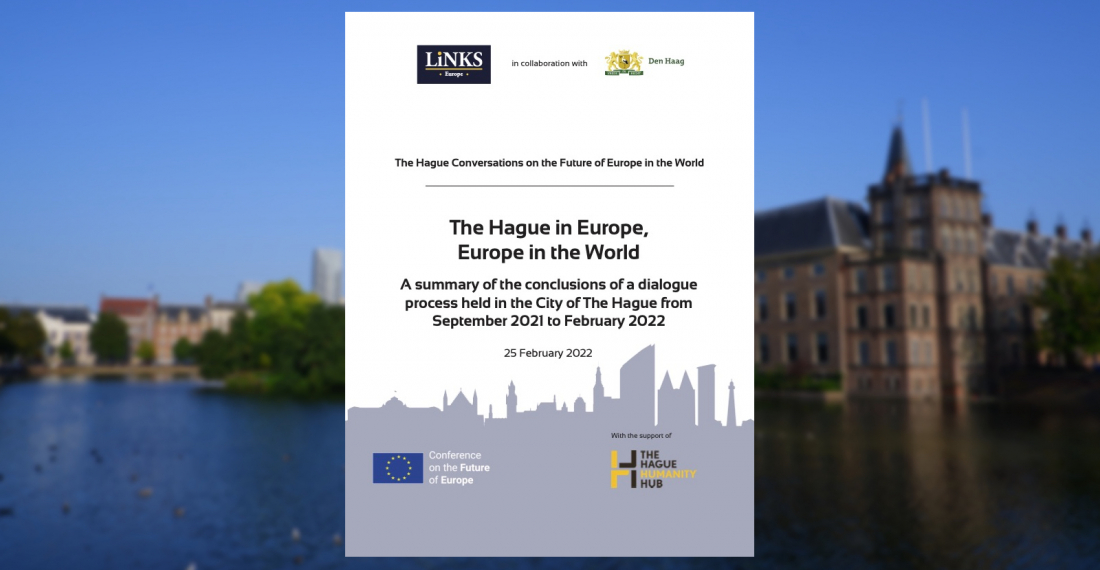Read the full report here.
The Hague Conversations on the future of Europe in the World was a series of ten activities organised by LINKS Europe foundation, in association with the City of The Hague and with the support of the Hague Humanity Hub. The events were mostly held in person, with some also held online or in hybrid format, from September 2021 to February 2022 as part of the “Conference on the future of Europe” process.
Hundreds of citizens of The Hague, and from the city’s rich ecosystem of international organisations, diplomatic and political communities, think-tanks, education institutions, NGOs and community groups, attended and contributed to the conversation. Others joined from other parts of the Netherlands and the EU, and even from beyond, to contribute with their ideas. Opinions were also submitted in written form.
The big question discussed throughout the process was: What should be the future role of Europe in the world, and what should be the role of the City of The Hague in this?
Overwhelmingly, participants in The Hague Conversations on the future of Europe in the World believed in the importance of the European Union for future peace, justice and prosperity in Europe and its neighbourhood and in the wider world. They believe the European Union has been and should remain a force for good in the world. They also felt that The Hague can and should play a more active role in designing and delivering the new Global Europe agenda.
Participants had some key messages for the European Union:
-
A constant theme in all the discussions was the importance that the EU should listen more, and communicate better.
-
If citizens are expected to support, and pay, and in some circumstances even fight and die for a European role in the world, they need to be informed and as much as possible consulted; they expected their representatives in the European Parliament, and intermediaries between them and officialdom, be it think-tanks, civil society, academia or the media, to play a bigger role in oversight of EU foreign and security policy.
-
There was widespread recognition that the world is passing through a dangerous moment, and that Europe and its citizens were facing new dangers, and that hardly won principles and values that have become a bedrock of EU society were now under threat. The EU should remain a normative power, but it must lead by example: a Europe that is divided on its values cannot efficiently disseminate these values to the rest of the world.
-
Europe must sharpen its soft power tools, even as it slowly builds its hard power tools. The EU needs to see itself as a soft-power superpower. Hard power needs to be a last resort and delivered as part of a broader Team Europe effort, which should also include NATO.
-
Global Europe cannot succeed unless the EU gets its relations with its neighbourhood right. This requires more clarity on enlargement; stronger engagement in the process of developing a new European security architecture, and a renewed effort to engage with the neighbourhood south.
-
The EU should continue to pursue multliateralism and a rules-based international system as the basis of its foreign policy, supporting the UN and leading in the process of its reform.
-
EU foreign policy starts at home. Contradictions within the EU on issues of democracy, human rights and the rule of law weaken the European message abroad. At municipal and national levels, authorities need to empower citizens to better understand the role of Europe in the world, and be involved in the design and delivery of Global Europe.
Participants felt that The Hague, as the City of Peace and Justice, should be at the forefront of these processes, including through empowering its diverse communities, its strong ecosystem of think tanks, academic institutions, and civil society groups to work in partnership with governments and EU institutions for a Global Europe that is a force for good in the world.






